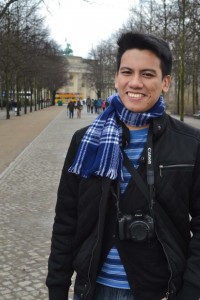We would like to congratulate Mr Raymund Victor Morales Vitorio, our graduate student in English Language, for winning the Graduate Student Teaching Award (GSTA) for teaching done in Semester 2 of 2014/2015.
Below Mr Vitorio explains his methods and ideals in teaching sociolinguistics to undergraduates.
“One of the biggest challenges in teaching sociolinguistic courses is the need to sufficiently address both the ‘socio’ and ‘linguistics’ branches of the field. As a teaching assistant, I always try to expose students to the great potential of using an interdisciplinary lens in viewing linguistic phenomena.
My training as a sociolinguist has influenced my view of teaching. I believe that the unique and influential position of the teacher in the classroom opens up opportunities for the simultaneous development of knowledge and critical stances. Hence, I have always striven to adopt transformative pedagogy in my teaching. I see the classroom as an opportunity to constantly question the positions of the students and the teacher, and to develop a sense of criticality of both. I aspire to make students develop critical thinking that would allow them to see that they are not just mere passive learners; rather, they are active agents who can realize concrete scholarly and social pursuits. This transformative approach also requires me to be self-aware and self-critical. Moreover, I highlight the inextricable connection between language and society in my teaching strategies. Given that language is one of the most important facets of humanity and society, I believe that there is a compelling need to teach students the technical aspects of linguistics in relation to their social repercussions. With this teaching philosophy, I aim to train my students as independent, critical, and responsible researchers.
While my position as a teaching assistant is rather constrained in terms of the formulation of the class topics and requirements, I always try to include ‘new’ yet relevant things in my tutorials. I always tell my students that the goal of tutorials is not to merely answer the discussion questions—rather, it is to come up with an intelligent discussion based on the given guiding questions. I encourage students to go beyond the discussion questions by interrogating larger issues of language and society, which includes critiquing the questions, applying the concepts in their own contexts/linguistic backgrounds, and suggesting good ways of conducting future studies. In this case, I can capitalize on my role as a teaching assistant as being someone who can make students transform knowledge for their self-improvement. Moreover, I require my students to ask good questions, and to address those questions made by their peers. This makes teaching more collaborative, and makes the tutorial an experience shared by everyone. In my experience in teaching various linguistics courses at NUS for the past four years, I have helped students appreciate the value of learning discrete features of language on a more personal level—which makes them see the role of linguistics in their everyday lives.”
